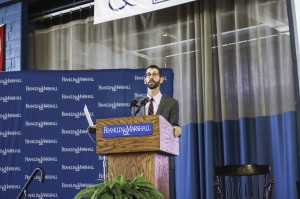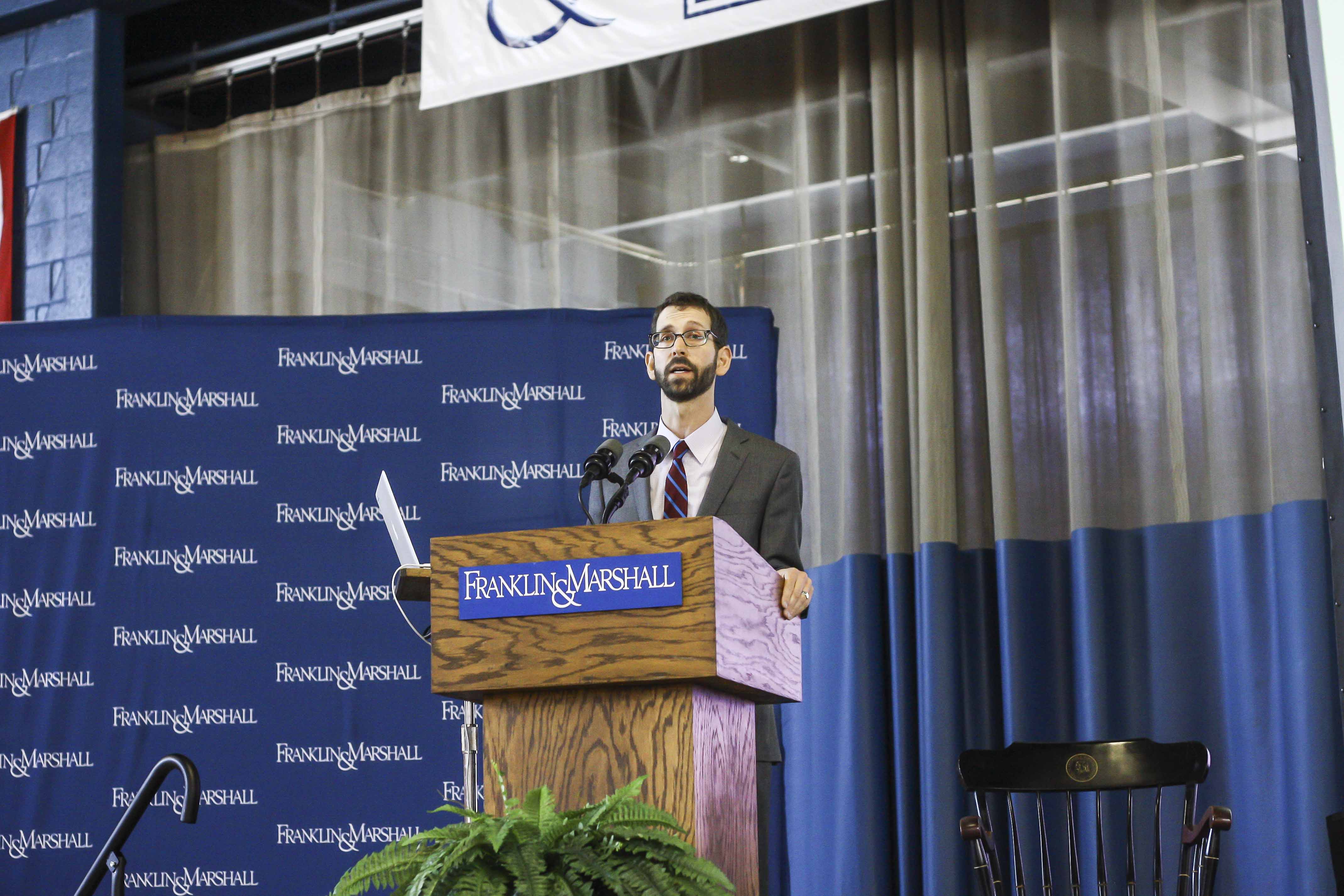 By Julia Cinquegrani ’16, Campus Life Editor
By Julia Cinquegrani ’16, Campus Life Editor
At the first Common Hour lecture of the Spring semester, Neil Gross, professor of sociology at the University of British Columbia, discussed why significantly more American college professors identify as politically liberal than conservative. His presentation was based on research from his new book Why are Professors Liberal and Why Do Conservatives Care?
Throughout the talk Gross explained the connections between professors’ ideology, politics, and personal beliefs, and how these factors can affect classroom learning and the public’s perception of academia.
Gross began his talk with two main assertions. First, professors in higher education tend to be more liberal than most Americans. Second, Gross pointed out that this has been true for many decades so current research on this topic should focus on long-term factors that could explain this phenomenon.
Gross began his research by asking three main questions: what are the political beliefs of American college faculty; what factors explain these beliefs; and how do faculty political beliefs enter into teaching and research?
To begin answering these questions, Gross conducted a nationally-representative survey of faculty views. He sent a survey of approximately 100 questions about political and social views to professors from colleges across the U.S. He then followed up with in-depth interviews with some of the survey participants. Gross also conducted a public opinion poll about Americans’ attitudes toward bias in higher education, and whether the public sees it as a problem. He also used longitudinal studies and other data to supplement his research.
According to Gross, about 43 percent of American professors identify as liberal, making it the most liberal major occupation in the U.S. Gross also found professors tend to be more liberal on social rather than on economic issues.
Next, Gross turned to the question of why professors are more liberal. He argued that the socio-economic class of most professors — they are very well-educated but not very highly paid — gives them a unique status within American society.
“Professors have lots of what sociologists call ‘cultural capital,’ but not very much economic capital,” Gross said. “On one theory, this should make people more liberal. If what people have at their disposal is knowledge and high taste more than money, that might lead them to want to disrespect the business class and make the case that knowledge is more important than money.”
In addition, another of Gross’ hypotheses to explain the liberalism among professors argued that liberals and conservatives want different things from their jobs — liberals are more focused on bettering the world through their work, while conservatives place more emphasis on making money. However, throughout his research Gross did not find much data to support this theory.
Furthermore, some conservatives believe there is discrimination in upper level graduate work against conservative students and professors. Again, Gross did not find adequate evidence to support this idea. Rather, fewer conservatives choose to pursue higher education jobs.
By the conclusion of his research Gross found one theory in particular that seemed to hold true in explaining the liberalism of higher education.
“In my book I develop the idea that liberals are much more likely to want to go into academia,” Gross said. “And the reason for this is that when young people are trying to decide what career paths to go down, they tend to be guided not by rational decision-making, but by stereotype imaging of what different careers are like and their own values and identities. Most of us kind of feel around in the dark looking for careers that fit with our sense of who we are.”
Gross argued that stereotypes come to mind when we imagine different types of professions. Professors, for example, are often stereotyped as liberal-minded free spirits, so it can be difficult for conservative young people to imagine fitting into the profession.
College students who are liberal are also much more likely to go to graduate school than conservative students. Thus, Gross argued that reputational self-selection is the biggest explanation for why many professors are liberal.
“But is this a circular theory?” Gross questioned. “Am I saying that professors are liberal because academia has a reputation for being liberal? Yes and no. Academia has been liberal for a very long time, and we should think of academic liberalism as a self-reinforcing process. Once higher education was identified as a liberal field liberals started self-selecting into it. This then bolstered the reputation of it as a liberal field, and so on.”
Yet this process had to start somewhere, and Gross believes it began during the Progressive Era in the U.S., which was during the founding of many American research universities. College professors also became more sharply liberal during the New Deal era.
Gross researched the implications of the liberalism of professors, by studying whether professors believe they should share their political beliefs in class discussions. He found that professors are split roughly in half on whether or not they believe they should share their political views with their students.
In terms of the implications of his findings for the future, Gross does not seem to think academia’s liberalism will greatly shift the American political landscape anytime soon.
“There has been a dramatic growth in college attendance in recent years, and, while that has probably done something to help liberalize Americans’ views on things like marijuana use and homosexuality, the last time I checked, the Republican Party is still around and people who identify as conservative still greatly outnumber the amount of people who identify as liberal in the general population,” Gross said.
In a change from previous Common Hours, after Gross finished his discussion, a panel of two professors and one student began commenting on and asking questions about his research. Audience members were asked to tweet using #commonhour or email questions to a designated email account to ask Gross questions.
Gross answered questions ranging from the role of students’ critical thinking when dealing with professors’ political beliefs to the amount of research that still needs to be done within this field to further supplement his findings.
“There is no one-size-fits-all answer in how we should have professors deal with their political beliefs in the classroom,” Gross said. “Social scientists right now are not very good at disentangling psychological from social factors in the formation of political belief and future research could help develop these ideas.”
Sophomore Julia Cinquegrani is the Campus Life Editor. Her email is jcinqueg@fandm.edu.
